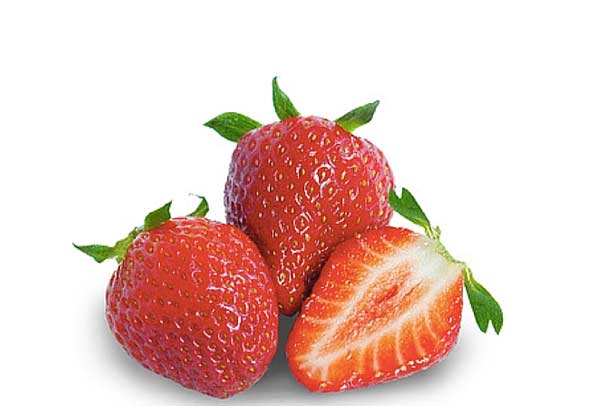Strawberry
The garden strawberry is a widely grown hybrid species of the genus Fragaria, collectively known as the strawberries. It is cultivated worldwide for its fruit. The fruit is widely appreciated for its characteristic aroma, bright red color, juicy texture, and sweetness.
Store strawberries in the fridge as soon as possible after purchase. Keep the punnet upright and handle carefully to avoid bruising.
It is important that strawberries are brought to room temperature before eating; this brings out the fullest flavours in the fruit.
Always wash your strawberries before you eat them. The best way to do this is to carefully place them into a colander, rinse under cold water and gently pat dry with kitchen towel.
Strawberries boast a range of potential benefits to the health and can help protect against a range of diseases.
1) Heart disease
of anthocyanins, a class of flavonoids found in berries, can reduce the risk of a heart attack by 32 percent in young and middle-aged women.
Women who consumed at least three servings of strawberries or blueberries per week fared best according to a study published in Circulation journal.
The flavonoid quercetin, contained in strawberries, is a natural anti-inflammatory that appears to reduce the risk of atherosclerosis and protect against the damage caused by low-density lipoprotein (LDL) cholesterol in animal studies.
The high polyphenol content in strawberries may also reduce the risk of cardiovascular disease by preventing platelet build-up and reducing blood pressure via anti-inflammatory mechanisms.
Other studies have shown that eating strawberries helps to lower homocysteine levels, an amino acid in the blood associated with damaging the inner lining of arteries.
The fiber and potassium in strawberries also support heart health. In one study, participants who consumed 4,069 milligrams (mg) of potassium per day had a 49 percent lower risk of death from ischemic heart disease compared with those who consumed about 1,000 milligrams of potassium per day.
2) Stroke
The antioxidants quercetin, kaempferol, and anthocyanins have all been shown to reduce the formation of harmful blood clots associated with strokes. High potassium intake has also been linked with a reduced risk of stroke.
3) Cancer
The powerful antioxidants in strawberries may work against free radicals, inhibiting tumor growth and decreasing inflammation in the body.
4) Blood pressure
Due to their high potassium content, strawberries are recommended to those with high blood pressure to help negate the effects of sodium in the body. A low potassium intake is just as big a risk factor for developing high blood pressure as a high sodium intake.
According to the National Health and Nutrition Examination Survey, fewer than 2 percent of American adults meet the daily 4,700-milligram recommendation for potassium.
Also of note, high potassium intake is associated with a 20 percent reduction in the risk of dying from all causes.
5) Constipation
Eating foods that are high in water content and fiber, like strawberries, grapes, watermelon, and cantaloupe can help keep the body hydrated and bowel movements regular.
Fiber is essential for minimizing constipation and adding bulk to the stool.
6) Diabetes
Strawberries might be an excellent choice for people with diabetes.
Strawberries are a low glycemic index food and high in fiber, which helps to regulate blood sugar and keep it stable by avoiding extreme highs and lows.
Strawberries are a smart fruit choice for diabetics, as they have a lower glycemic index (40) than many other fruits.
Researchers discovered in 2011 that eating about 37 strawberries a day can significantly reduce the complications of diabetes, such as kidney disease and neuropathy.
The study showed that fisetin, a flavonoid contained in abundance in strawberries, promoted survival of neurons grown in culture and enhanced memory in healthy mice, along with prevention of both kidney and brain complications in diabetic mice.
7) Pregnancy
Strawberries are a great source of folic acid.
Adequate folic acid intake is essential for pregnant women to protect against neural tube defects in infants.
PRODUCT SPECIFICATION
| Name Of Product | Packing | TYPE | GROSS WEIGHT | Keep At °C | Origin Country |
| Strawberry | Plastic Box | CLASS A | 1 Kg , 2 Kg , 5 Kg , | 0 to 2 °C | IRAN |

